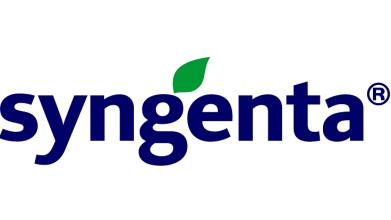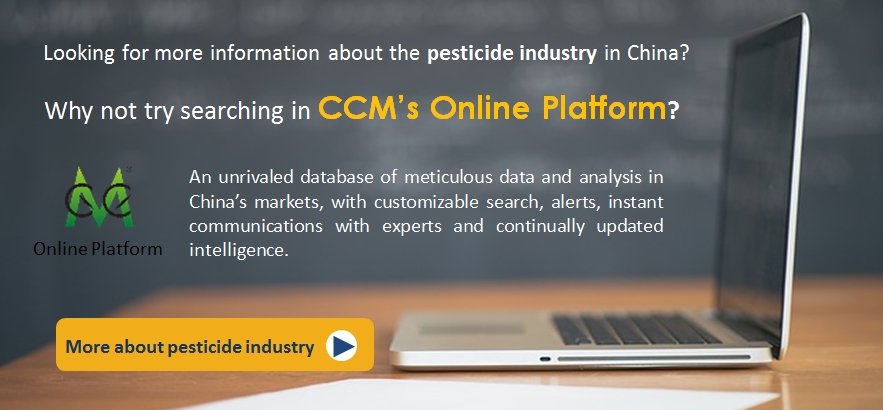Global
pesticide market is still in downturn and the global pesticide giants also
performed badly in their sales. The five major pesticide giants in the globe,
Syngenta AG (Syngenta), Bayer CropScience AG (Bayer CropScience), BASF SE
(BASF), Dow AgroSciences LLC (Dow AgroSciences) and E. I. du Pont de Nemours
and Company, Inc. (DuPont), all can’t still pick themselves up from the bottom
regarding to no matter the third quarter sales performance or that of the first
three quarters.

Source: Baidu
However,
these five pesticide giants still shone for their star products in the
pesticide market in the world in 2016.
CCM
is here to share the analysis on the performance of these five giants.
Syngenta:
Pesticides sales value goes down 7.3% YoY in first three quarters
On
pesticide sales performance
In Q3 2016, pesticides sales value went down 6.2% YoY in Syngenta, with the sales
value of USD2.036 billion. If calculated with the 7.7% decline in H1 2016, the
pesticides sales value decreased 7.3% YoY in Q1-Q3, with the sales value of
USD7.28 billion.
In
Q3 2016, Syngenta total sales value of pesticide, seed and trait business was
USD2.384 billion, down 3.9% YoY. As for that in Q1-Q3 2016, the total sales
value was USD9.142 billion, down 6.6% YoY.
The
sales performance of herbicides was weaker than that of fungicides. In Q3 2016,
the sales value of herbicides took up 32.5% of the total pesticide sales value,
with the sales value of USD662 million, up 2.3% YoY. As for Q1-Q3 in 2016, the
sales value of herbicides was USD2.903 billion, down 6.9% YoY.
The
increasing sales value of selective herbicides was mainly driven by the North
America market. The sales value of quaternary mixed herbicide Acuron
(bicyclopyrone + mesotrione + atrazine + S-metolachlor) almost doubled in the
US market, with the sales value breaking through USD200 million.
As
for the non-selective herbicides, the sales value went down due to the fact
that Syngenta decreased the sales of glyphosate single formulation in North
America market on purpose.
When
it comes to fungicide, in Q3, its sales value took up 32.3% of the total
pesticides sales value in Syngenta, with the sales value of USD627 million,
down 12.4% YoY, which was caused by changes of selling clauses in Brazil and
the dry weather.
However,
the demand for fungicide was strong in Association of Southeast Asian Nations
(ASEAN), especially the increasing demand for its products Amistar
(azoxystrobin as active ingredient) and Score (difenoconazole as active
ingredient), which helped narrow down the decline in fungicide sales
performance. In the US, Trivapro (benzovindiflupyr as active ingredient)
entered the market successfully.
As
for insecticide, the sales value was USD405 million, down 15.8% YoY in Q3 2016.
The sales amount went down in Brazil but increased in South Asia market.
The
sales value of seed treatment formulation was USD266 million, up 2.3% YoY in Q3
2016, which was driven by the technology promotion in China and South-east
Europe.

On
sales markets
In
Q3 2016, Syngenta’s pesticide sales value increased 5.1% in Europe, Africa and
Middle East, with the sales value of USD395 million, which was attributed to
the huge increase of fungicide sales and successful promotion of seed treatment
formulations.
However,
the sales value of pesticides inQ1-Q3 2016 went down 4.6% YoY in the above
areas, with the sales value of USD2.421 billion; and it increased 29% YoY in
the Commonwealth of the Independent States (CIS) but decreased 6% YoY in west
Europe.
In
Q3 2016, the sales value of pesticides was USD404 million in North America, up
11.3% YoY, which was a reflection of continuously successful development.
The
sales value of pesticides was USD881 million in Latin America, down 22.3% YoY.
In Brazil, the sales amount was kept affecting by the high inventory of
fungicide. With fewer occurrences of pests and enlarging areas of genetically
modified soybean, the demand for fungicide decreased in Brazil.
The
sales value of pesticides was USD356 million in Asia Pacific, up 22.3% YoY in
Q3 2016, thanks to the end of El Nino phenomenon and the good effect from
monsoon climate. Asia Pacific has strong demand for pesticide, especially the
demand for fungicide from ASEAN and that for insecticide from South Asia.
However, the sales value of pesticides in Asia Pacific was USD1.127 billion in
Q1-Q3 2016, down 3.9% YoY.

On
mergers and acquisition
According
to Syngenta, the acquisition by China National Chemical Corporation (ChemChina)
is in good process and already gets the approval from both the Committee on
Foreign Investment in the United States (CFIUS) and 11 anti-monopoly
institutions. Erik Fyrwald, CEO of Syngenta stated that, Syngenta was acquired
to supplement more documents to Europe Union and management departments in
other areas. It was predicted that the approval of the acquisition would be
completed in Q1 2017.
On
prospect
Mr.
Erik Fyrwald said: “In Q4 2016, I hope that the Asia Pacific market would
recover and Latin America market would get improved.” Syngenta hopes that it
wouldn’t get further affected by the changes of selling terms in Brazil and
hopes to benefit from the stable currency in Brazil in Q4 2016. Also, Syngenta
is expecting to make profit from the new fungicide product – Pydiflumetofen
(pyridine as active ingredient) which entered Argentina market in Nov. 2016.
Syngenta
believes that the sales value may fall a little bit in 2016 but the EBITDA
would remain the same as that in last year.
About CCM:
CCM is the leading
market intelligence provider for China’s agriculture, chemicals, food &
ingredients and life science markets.
Do you want to find
out more about the pesticide market in China? Join our
professional online platform today and get insights
in Reports, Newsletter, and Market Data at one place. For more trade
information on pesticides visit our experts in trade analysis to get your answers
today.
Tags: Pesticides, Syngenta